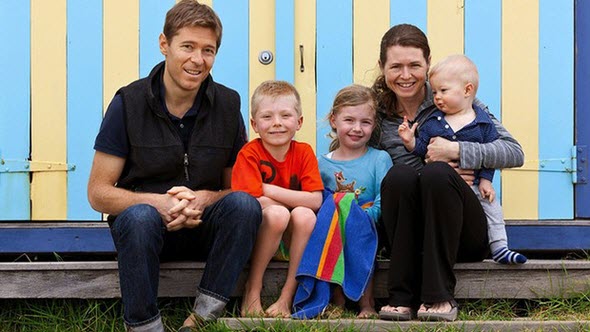Bittersweet victory for ‘Save Locky’s Dad’ campaign comes too late for Nick Auden
Source: The Age National, March 2014
In a bittersweet development for Nick Auden’s family, the “Save Locky’s Dad" campaign appears to have expanded access to the potentially life-saving drug he was seeking, just three-and-a-half months after he died.
Mr Auden, a Melbourne-born father-of-three who died from advanced melanoma aged 41 last year, spent the last two months of his life in a desperate race against time to get access to one of Merck or Bristol-Myer Squibb’s promised new “anti PD-1" drugs.
The immunotherapy drugs, known as Lambrolizumab and Nivolumab, have been shrinking tumours in scores of people in clinical trials and Australian Grand Prix boss Ron Walker has credited the Merck drugs with saving his life.

Source: The Age National
Despite receiving more than 524,000 signatures on a Change.Org petition and the backing of politicians and celebrities, including Ricky Gervais last year, it has now emerged Mr Auden missed out on a compassionate access scheme in the US by just a few months.
Mr Auden, who was living in the US where he worked as a commercial manager for Orica, could not get the investigational drugs because he missed out on clinical trials. For this reason, he pleaded with the companies to give him what is known as “expanded" or “compassionate" access to the medication, which is an option for the companies while the drugs are still in development.
In cruel timing, Merck announced this week that it was launching an “expanded access program" for its PD-1 drug Lambrolizumab (or MK-3475) in the US for people “who have serious or immediately life-threatening illnesses for which no comparable or satisfactory alternate therapies are available."
A spokeswoman for the company said it planned to make the scheme available to Australian patients “at the earliest possible time" but did not say when that could be. At the moment, only 175 patients with melanoma are receiving the drug in clinical trials.
Mr Auden’s bereaved wife Amy Auden welcomed the program but said the timing was “absolutely devastating".
“Words cannot express the emotion I feel… The people at Merck said that they did not want to ‘play God’ by giving the drug to Nick (they were concerned about not having enough of the drug for everyone with stage 4 melanoma), however by denying Nick the drug, they in effect did just that," she wrote in an email.
“Every minute of every day I am reminded that Nick is not here and I am widowed at 38 with 3 young kids. Right now, however, I am trying to focus on the fact that were it not for the campaign, a compassionate use program for the new melanoma breakthrough drug would not be a reality for others."
Shortly after arriving in the US in 2011, Mr Auden was diagnosed with stage four melanoma. The prognosis for the disease is poor, but the new anti-PD-1 drugs have been raising hope it will improve. It is unclear if the drug offers a cure, but doctors say some people have lived years on the drugs when they would have otherwise died within months.
Mr Auden repeatedly failed to meet the criteria for clinical trials of the drugs, however in 2013, he qualified for one before a bowel obstruction later disqualified him from it.
When his disease progressed in November last year and it became clearer that he would not get compassionate access to an anti-PD-1 drug, he flew to Texas with his wife Amy for a last-ditch experimental treatment called TIL Therapy. They hoped it would stave off the cancer’s progress until he got an anti-PD-1 drug.
Sadly, it did not and Mr Auden’s health deteriorated. He was flown to his Denver home via air ambulance to spend a last, precious, few days with his three beloved children, Locky, Hayley and Evan. He died on November 22.
